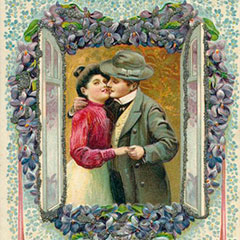Saint Valentine’s Day
Valentine’s Day is now viewed as the celebration of love, but its history is quite tangled. This holiday’s origin has historical as well as legendary interpretations. Among the possibilities, there is the story of Bishop Valentin de Terni who, during the 3 rd century, would give engaged couples his blessing. The rumour spread that “valentine weddings” were happy and long-lasting. A victim of his own success, the bishop dedicated February 14 th to a general nuptial blessing.
Another interpretation indicates “valentining” was originally a French custom, that came to Normandy with the Scandinavian invasions. According to this tradition, each valentine chose a lady to be his beloved for the duration of a year. As these unions often ended in marriage, the custom is now associated with an engagement or the flirting period of new relationships.
Before the 1763 Conquest, there is no trace of this celebration in Québec. It is therefore believed Valentine’s Day was introduced by the English. It is only during the 19 th century that it truly took root in our traditions. Sending love letters and Valentine cards is mostly men’s prerogative, since chivalry is a privilege and duty of men. The “valentining” custom began to rise in the industrial era, thanks to the commercialisation of literature and stationery. Despite a temporary lull caused by the two World Wars, Saint-Valentine’s Day made a comeback in the post-war period.
Nowadays, Valentine cards are sent by women as well as men. Valentine’s Day is merely an occasion for couples to point out or reaffirm their fondness to each other in a special moment.
Love Songs
Valentine’s Day is a great occasion to listen to love songs. Love is a theme that has inspired many artists, in every musical style. From time immemorial, most compositions are dedicated to matters of the heart. Archeological research has revealed a love song on the walls of a tomb, written in hieroglyphics surrounded with images of musicians, dating back 2181 years.
There are love songs of every type and, whatever our mood, there exists a song to voice our emotions. Scientific evidence sheds light on the relation between music, romance and seduction, demonstrating that music has an impact on an intimate relationship. Not only do songs allow the suitor to communicate their intentions, but also to directly sway their mood during a romantic encounter. We could also add that music activates the same pleasure centres in the brain as food or sex.
Composed in 1784 by German Jean-Paul Égide Martini (1714-1816), with lyrics by Jean-Pierre Claris de Florian (1755-1794), the song Plaisir d’amour (literally “the pleasure of love”) is more than 200 years old. Originally called Romance du chevrier , the song was renamed during the first half of the 19 th century. The momentous success led Berlioz to create a version for a smaller orchestra in 1859. Along the decades, the song’s popularity increased. With the invention of the record, many artists performed it: Yvonne Printemps, Tino Rossi, Nana Mouskouri. Even Elvis Presley was inspired by it!
Romantic Music
Download video: MP4 , (34,05 MB ), WebM , (35,77 MB ), Ogg (32,05 MB ) (2 minutes 53 seconds)
Interview with Magali Lemieux, Teacher in Social Integration and Musician, about romantic music, from the troubadours to modern songs.
Interview with Magali Lemieux
I will jump in time and go directly, while staying in the history of Western music, to the Romantic period. We have Chopin, Schubert, Schumann, offering us this nostalgic music that is kind of adolescent, ephemeral, passing.
And if we keep talking about classical music, it's funny because love is very present in operas. There's nothing better than operas for twisted love stories where antagonists often mutilate and assassinate, which often end with crimes of passion.
If we talk about romantic music, but in the twentieth century, well I think a lot about songs. I think it's inevitable, I immediately think about American cinema. It always ends well; love stories are a little mushy, a little too simple sometimes, with Marilyn and Elvis making us dream. And still talking about today's English music, but this time rock music, I think about Jimi Hendrix whose music I love very much, who with his dirty guitar offers us love stories somewhat less advisable than those of the American cinema.
I'll talk about French music now, I just have to. Piaf and Brel who sang about love that rips you apart, love that gives up everything even if it means giving up your life. Still in France, we have Francis Cabrel who sang about love, I think there is not one teenage girl who did not fall head over heels for L'encre de tes yeux or Je l'aime à mourir.
Let's stop in the province of Québec for a while now. We have so many beautiful love songs. We have amazing singers. I think of Vigneault singing about a love that has deep roots. Desjardins singing about the North, and giving a voice to men who may not have been able to write poems or sing love songs. No matter whether love stories have a happy or sad ending, I think we'll forever sing and write and be inspired by love.
Magali Lemieux
Teacher in Social Integration and Musician
Technical Team:
David Leblanc: Director/Cameraman/Editor
Jonathan Leblanc: Technician
Acknowledgement
Conservatoire de musique de Trois-Rivières


